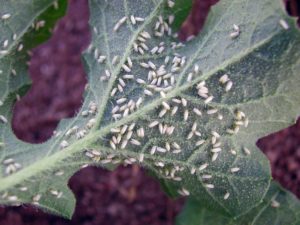Whiteflies are so prevalent on so many crops, growers need to know every tool available to use for control. Development of resistance to conventional insecticides continues to whittle down the number of effective products, even as new ones are introduced. Botanical oils – those made from plant essential oils such as rosemary and mint, have a place in a whitefly program because of the unique benefits they offer.

Whitefly infestation on a watermelon leaf. Photo: CSIRO
Dr. Murray Isman, Professor of Entomology/Toxicology at The University of British Columbia, lists these benefits as multiple modes of action, short residual activity, less toxicity to bees, zero preharvest interval (PHI), zero worker reentry interval (REI) and no maximum residue restrictions.
“We know botanical oils probably have several modes of action at the molecular or cellular level,” Isman says. “The best known and most understood is the interference with octopamine, which is a neuromodulator unique to arthropods and other invertebrates. Warm-blooded animals do not produce octopamine, which means humans are not affected by its disruption. This gives us a good margin of safety when botanical oils are used on edible crops.”
Isman says there is evidence of at least two other molecular targets in insects, and researchers are just beginning to explore these.
“What we don’t know is which of these or which combination of these actually kill the insect,” Isman says. “But we know the mode of action is very different from conventional insecticides like neonicotinoids or carbamates or pyrethroids.”
Residual Activity Lasts Longer Than Acute Phase
Botanical oils have a short residual activity in terms of killing insects. But there is a longer-lasting effect on the behavior of the insect, either preventing egg laying or repelling the insect all together. It is a more complicated picture than you get with conventional insecticides, where acute toxicity may last five to ten days and then drops off.
“With essential oils, the drop off is very fast, but there is a pretty effective residual behavioral effect,” Isman says. “At the end of the day, what you want is to not have pests on the crop. It doesn’t matter how you get there as long as you get there. We have seen field trials in California where we’ve observed this residual effect on spider mites that provides up to two weeks of protection.”
Whiteflies are susceptible to both the acute and the behavioral effects of botanical oils. Since whitefly nymphs develop on the undersides of leaves, it is difficult to get good coverage when spraying. The adults are more vulnerable, because they are less protected. In the case of essential oils, the residual behavioral effect reduces the number of surviving adults settling on plants and laying eggs. Keeping populations low allows oils – and conventional chemicals – to be more effective.
“There’s no doubt that once whitefly populations are well established, they are really difficult to eradicate,” Isman says. “Botanical oils, like most insecticides and even horticultural mineral oils, should be used at the first sign of infestation.”
Tank-Mixing Reduces Costs
Isman says researchers have discovered that tank-mixing botanicals with conventional chemicals extends the residual activity of both and allows a reduction of the rate of both by about 50%.
“We think the oils are very good spreaders and penetrants in addition to having their own insecticidal and repellant action. You can use half the normal rate of Ecotrol, for example, and half the rate of the conventional product and still achieve very good efficacy,” Isman says.
Fitting Into a Spray Program
For whiteflies and other piercing, sucking pests such as thrips, aphids and mites, Isman recommends a three-week spray rotation – two weeks if a grower is fairly confident he or she will have these problems in their crop. Because of their unique mode of action, including botanical oils in the rotation (whether tank mixed or alone) along with traditional chemistries helps prevent buildup of pest resistance.
The short residual activity makes oils work well during the flowering season, as well.
“Bees are susceptible to botanical oils when they are first sprayed. But the short residual toxicity means if oils are sprayed in the evening, by the time bees become active the next morning they are much less likely to pick up a toxic dose and take it back to the hive,” Isman says.
At harvest, this same short residual period makes botanical oils perfect for last-minute insect control. Because there are zero REI and zero PHI requirements, as well as zero maximum residue levels, they can be sprayed at any time before harvest without loss of labor or time. While whiteflies aren’t a problem on the actual harvested product, they can still be causing problems on the mother plants, such as grapevines or tomatoes.
“This is a huge advantage for berry growers or fruit growers, especially hand-harvested crops where worker safety is an issue,” Isman says. “We haven’t had any reports of postharvest sprays of botanical oils causing flavor changes in the harvested produce. That’s something a grower would certainly want to be aware of. I think because the oils dissipate pretty quickly, any odor or flavor would have disappeared by the time it hits the marketplace.”
* Ecotrol is a product manufactured by Keyplex.
